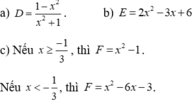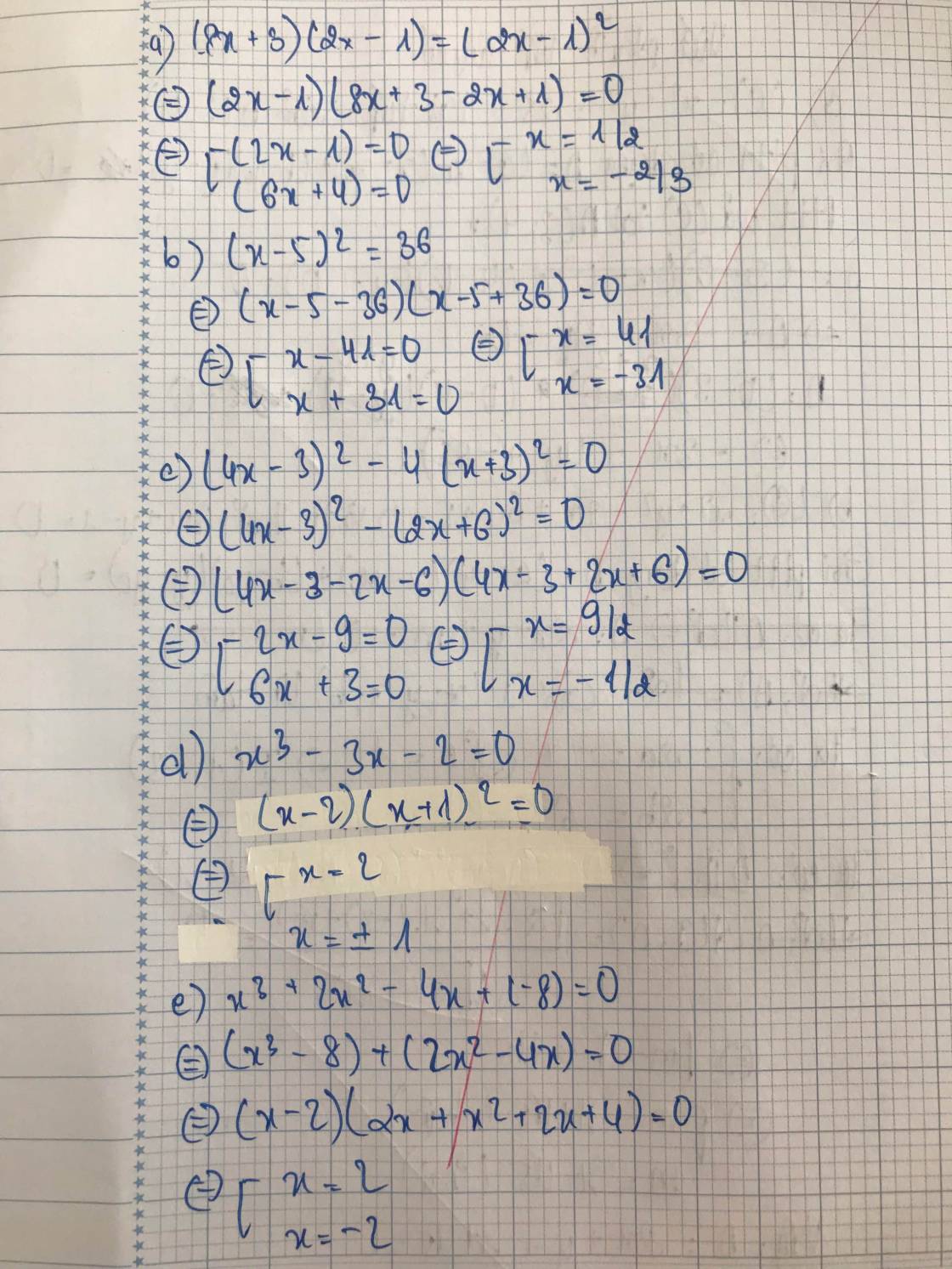
Hãy nhập câu hỏi của bạn vào đây, nếu là tài khoản VIP, bạn sẽ được ưu tiên trả lời.


a: =>2x^2+9x-6x-27=0
=>x(2x+9)-3(2x+9)=0
=>(2x+9)(x-3)=0
=>x=3 hoặc x=-9/2
b: =>-10x^2+6x-5x+3=0
=>-2x(5x-3)-(5x-3)=0
=>(5x-3)(-2x-1)=0
=>x=-1/2 hoặc x=5/3
c: =>-x^3+2x^2-x^2+4=0
=>-x^2(x-2)-(x-2)(x+2)=0
=>(x-2)(-x^2-x-2)=0
=>x-2=0
=>x=2
d: =>(x^3+8)-4x(x+2)=0
=>(x+2)(x^2-2x+4)-4x(x+2)=0
=>(x+2)(x^2-6x+4)=0
=>x=-2 hoặc \(x=3\pm\sqrt{5}\)

a: ta có: \(x^2+3x-\left(2x+6\right)=0\)
\(\Leftrightarrow\left(x+3\right)\left(x-2\right)=0\)
\(\Leftrightarrow\left[{}\begin{matrix}x=-3\\x=2\end{matrix}\right.\)
b: Ta có: \(5x+20-x^2-4x=0\)
\(\Leftrightarrow\left(x+4\right)\left(5-x\right)=0\)
\(\Leftrightarrow\left[{}\begin{matrix}x=-4\\x=5\end{matrix}\right.\)

\(\left(x+2\right)\left(x^2-2x+4\right)-\left(x^3+2x^2\right)=0\\ \Rightarrow x^3+8-x^3-2x^2=0\\ \Rightarrow-2x^2+8=0\Rightarrow x^2=4\Rightarrow\left[{}\begin{matrix}x=2\\x=-2\end{matrix}\right.\\ \left(x-1\right)^3+\left(2-x\right)\left(4+2x+x^2\right)+3x\left(x+2\right)=17\\ \Rightarrow x^3-3x^2+3x-1+8-x^3+3x^2+6x=17\\ \Rightarrow9x=10\\ \Rightarrow x=\dfrac{10}{9}\)
\(\left(x+2\right)\left(x^2-2x+4\right)-\left(x^3+2x^2\right)=0\)
\(x^3+2^3-x^3-2x^2=0\)
\(2\left(4-x^2\right)=0\)
\(4-x^2=0\)
\(x^2=4\)
⇒\(\left[{}\begin{matrix}x^2=\left(-2\right)^2\\x^2=2^2\end{matrix}\right.\)
⇒\(\left[{}\begin{matrix}x=-2\\x=2\end{matrix}\right.\)

a) \(x^3-x^2+3x-3>0\)
\(\Leftrightarrow x^2\left(x-1\right)+3\left(x-1\right)>0\)
\(\Leftrightarrow\left(x^2+3\right)\left(x-1\right)>0\)
Mà: \(x^2+3>0\forall x\)
\(\Leftrightarrow x-1>0\)
\(\Leftrightarrow x>1\)
b) \(x^3+x^2+9x+9< 0\)
\(\Leftrightarrow x^2\left(x+1\right)+9\left(x+1\right)< 0\)
\(\Leftrightarrow\left(x^2+9\right)\left(x+1\right)< 0\)
Mà: \(x^2+9>0\forall x\)
\(\Leftrightarrow x+1< 0\)
\(\Leftrightarrow x< -1\)
d) \(4x^3-14x^2+6x-21< 0\)
\(\Leftrightarrow2x^2\left(2x-7\right)+3\left(2x-7\right)< 0\)
\(\Leftrightarrow\left(2x^2+3\right)\left(2x-7\right)< 0\)
Mà: \(2x^2+3>0\forall x\)
\(\Leftrightarrow2x-7< 0\)
\(\Leftrightarrow2x< 7\)
\(\Leftrightarrow x< \dfrac{7}{2}\)
d) \(x^2\left(2x^2+3\right)+2x^2>-3\)
\(\Leftrightarrow2x^4+3x^2+2x^2+3>0\)
\(\Leftrightarrow2x^4+5x^2+3>0\)
\(\Leftrightarrow\left(x^2+1\right)\left(2x^2+3\right)>0\)
Mà:
\(x^2+1>0\forall x\)
\(2x^2+3>0\forall x\)
\(\Rightarrow x\in R\)
a: =>x^2(x-1)+3(x-1)>0
=>(x-1)(x^2+3)>0
=>x-1>0
=>x>1
b: =>x^2(x+1)+9(x+1)<0
=>(x+1)(x^2+9)<0
=>x+1<0
=>x<-1
c: 4x^3-14x^2+6x-21<0
=>2x^2(2x-7)+3(2x-7)<0
=>2x-7<0
=>x<7/2
d: =>x^2(2x^2+3)+2x^2+3>0
=>(2x^2+3)(x^2+1)>0(luôn đúng)

\(a,=\left(x+1\right)\left(x+3\right)\\ b,=-5x^2+15x+x-3=\left(x-3\right)\left(1-5x\right)\\ c,=2x^2+2x+5x+5=\left(2x+5\right)\left(x+1\right)\\ d,=2x^2-2x+5x-5=\left(x-1\right)\left(2x+5\right)\\ e,=x^3+x^2-4x^2-4x+x+1=\left(x+1\right)\left(x^2-4x+1\right)\\ f,=x^2+x-5x-5=\left(x+1\right)\left(x-5\right)\)


Ta có: \(x^3-2x^2+3x-6>0\)
\(\Leftrightarrow x^3+3x-2x^2-6>0\)
\(\Leftrightarrow x\left(x^2+3\right)-2\left(x^2+3\right)>0\)
\(\Leftrightarrow x-2>0\)
hay x>2